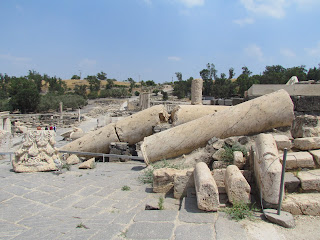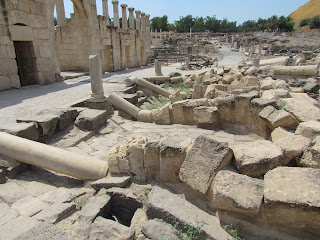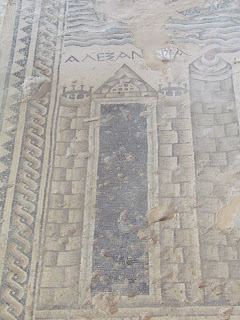I taught theology courses at Arrendale state prison, a women's prison in North Georgia. One of the classes I taught was the Book of Revelation. The interest in the class was so great we had to turn away students because we couldn't fit more people in the room. Revelation has fascinated Christian believers for 2000 years, and this group of women was no different.
Revelation is a book written in the first century by a man named John. It's an apocalyptic text, which was a popular form of Jewish writing at the time. The book is written to a group of Christians who are suffering at the hands of the state, a superpower named Rome. Rome wasn't just the state, or a superpower, it was THE state and THE superpower. Rome controlled everything: taxes, currency, trade, religion, land, sea, military--the entire system. Revelation is about a group of people who call out to God for help and rescue from the system. Their only possible solution was for a divine intervention.
John himself had suffered at the hands of the state, having been exiled to an island called Patmos for believing in Christ. One of the local Christians, Antipas, had been martyred for his faith. These particular Christians were suffering at every turn because of state power. They believed in Jesus, who they claimed was the son of God, but the back of their coins claimed Ceasar's son the son of god. They wished to worship in their synagogue, but Rome wanted everyone to worship the emperor, who claimed such titles as "savior," "God," "the gospel," "redeemer," and "bringer of salvation."
Now imagine how the Book of Revelation sounded to my students in prison. Some of them had committed horrible crimes. Some of them confessed to these crimes. And some of them didn't belong in prison altogether because they got really bad legal advice, or were convicted simply because they were riding with someone who committed a horrible crime they had nothing to do with. But all of them had one thing in common: they were all suffering under the hands of the state. Most of them had sentences that far outweighed their crime. Most of them, had they been given better legal advice, would have gotten a much better plea deal or avoided prison altogether. Yes, most of them committed crimes, but had they been wealthy enough to retain a good attorney they could have avoided such harsh penalties.
One of them, Kelly Gissendaner, committed a horrible crime: she arranged for her husband to be murdered. She was found guilty of the murder and sentenced to death, a sentence that will be carried out on Monday. The person who actually murdered her husband, Gregory Owen, confessed and struck a plea deal with the state. Gregory is not on death row, but is actually eligible for parole in eight years. Kelly, because of really poor legal advice, received no plea deal.
When I signed up to teach Revelation at the prison, the woman in charge of the program came to me quietly and asked me if I would be interested in teaching Kelly one on one. I didn't hesitate at the question and immediately said yes. I had expected to teach Kelly the book of Revelation; instead, Kelly taught me more than I could have ever imagined. She was brilliant, she laughed, she longed to see her children, she cried, and she learned. She isn't a monster, or a hateful being; but she is loving, and caring, and compassionate. She's one of the most beautiful people I've ever met.
Each week for thirteen weeks I entered the prison every Friday to teach my class. I taught my full class of thirty students, and then they would take me to another part of the prison to teach Kelly. We would wind our way through the prison behind eight secure doors where there was a maximum security room. Each week her personal guard would open the door for me and Kelly would greet me with a hug and a smile. I couldn't initiate any contact with any of the inmates, but I could accept it if they reached out to me. I gladly accepted it from Kelly each week!
My students had already graduated from the theology program at the prison, but wanted to keep learning. The classes I taught were the equivalent of Master's level classes. And as their professors, we expected Master's level work. The program was rigorous and required a great deal of studying. Each week when I entered into that maximum security room, where cameras and microphones monitored our every move, I found Kelly more prepared than any of my students. She was ready with questions, curiosities, excitement, and hope. I taught Kelly as if I was teaching an entire class of students. And I knew one thing, I'd better be prepared 100% each week, because I knew she would be.
Kelly is a deeply devout Christian believer. She has experienced the same love, grace, and mercy of God that all Christians feel. Yes, she committed an unthinkable crime. And she feels deep remorse for her actions. But she also feels forgiveness, grace, and the compassion that only God can provide.
Each week we would talk about Rome, and oppression, and suffering at the hands of the state. Revelation spells out how God will not only rescue the faithful, but bring salvation to anyone who confesses Christ. At every turn in the book, God offers salvation. Even as the God's wrath and judgment increases throughout the book, God's offer of salvation remains. For those who side with evil and commit horrible crimes, God still offers salvation.
Kelly is one of those people who took God's offer. And now, like those Christians in the first century, is suffering at the hands of an unforgiving and unmerciful state. The entire system is stacked against Kelly now, and her only alternative is to pray for a divine intervention. Please pray with me that somehow God will intervene on Kelly's behalf. But if not, we know just like the Christians in the first century that she will see God. She will be dressed in clean white linen, white as snow because her sins have been covered by the Lamb.




















































